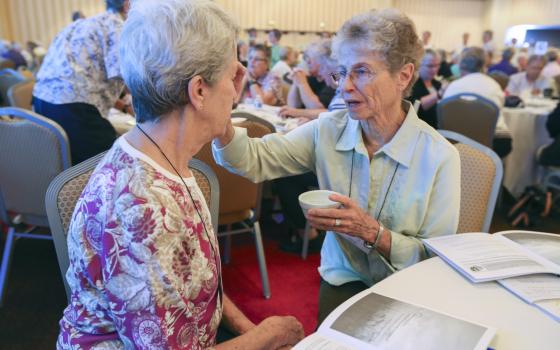How could we people of God act more like the People of God?
Imagine a community of communities. Imagine small groups that aim to embody God's presence in particular, local ways. Imagine initiative. Imagine being adults together, trusting in each other instead of in hierarchies. Imagine mutual accountability, forgiveness and laughter. Imagine strong relationships that look outward. Imagine solidarity with people who have been marginalized or abused.
All of this already exists. Not perfect, not full of saints … but real. Lay-led organizations offer working models at every level from international to parish. The most illuminating model I've seen is the Leadership Conference of Women Religious (LCWR) and its congregations – all lay women like me. Very quietly, with no spotlights, they've been evolving innovative ways to be a community of communities since the 1960s.
As Jamie Manson wrote in 2012, women religious "have created among themselves a form of church that so many restless Catholics long for: small, supportive, non-hierarchical, intimate communities that are deeply rooted in tradition, devoted to sacramental life, and grounded in outreach to the poor and marginalized."
A 2018 book offers an extraordinary inside look in However Long the Night: Making Meaning in a Time of Crisis: A Spiritual Journey, edited by Annmarie Sanders, IHM. Thirteen recent LCWR officers share hard-won personal learnings about a way of being rooted in God, community, charism and mission. I urge you to read it. As theologian Monika Helwig said, "Women religious practice being church for the church." Do we People of God want to practice alongside them?
To shape current church reforms, we People of God need to demonstrate what the healthy Body of Christ can be. We have been anointed at baptism into the priesthood of the faithful. We lay Catholics can take the initiative to discover together what it means to be Catholic communities alive with God's presence. The signs of the times demand it. We can invent bold, loving alternatives to toxic clericalism and to institutional rejection of the diversity in the people God has created. We can invite priests, bishops, and deacons to join in — all of us, with our varied gifts, equal in God's eyes and one another's. If we persist and remain in the Spirit, reforms will eventually catch up.
Here's a way to begin, and to enrich what is already underway. LCWR's book recounts choices during a time of crisis. The authors' choices raise vivid questions for us, personally and communally. Let's gather a few friends and take the questions seriously.
A little background: LCWR's learnings come from a period of immense difficulty when LCWR was under scrutiny by the Vatican, and then under mandate to reform in ways that threatened its identity and autonomy. Yet no other Vatican investigation in history has ended in issuance of a joint final report at a Vatican press conference featuring mutually respectful speakers from both sides. Why did this happen? Because the sisters stood on 50 plus years of the way of being that we imagined at the start of this article. Deliberate personal and communal openness to the Spirit led to genuine dialogue. They also relied on excellent preparation and process, documented throughout the book.
The authors' way requires radical trust in God. They discerned prayerfully, planned carefully and took one step at a time toward hope — or, at impasse, they simply took each step as it became visible. They trusted that God was at work in ways they might never see. Do we trust God like that? Are we willing to focus on right action instead of on outcomes?
Their relationships upheld integrity and nonviolence. This is nonviolence of the head and heart, not a tactic of resistance. "[W]e attempted to name realities, curb anger, and respond in ways that served the greater good" (64). "We would refuse to contribute to a climate of polarization; we would build bridges" (73). "The goal is not to win … but to live together in truth" (81). In a competitive, confrontational society and church where people readily condescend to those who make opposite choices, are we willing to use respect and patient dialogue as the route into shared truth?
These women aren't perfect and know it, so they make reflection and learning routine. Part of the power of this book is the window into how hard it can be to persist in these choices, and how vital it is to be part of a community with these shared commitments.
A contemplative relationship with God is the entry point. They put contemplation and prayer in their daily schedules. They pause in meetings and decisions for silent openness to the movement of the Spirit. Are we willing to give priority to being consciously in God's presence?
When people make these choices, what does governance look like? In the words of Katie Gordon (an organizer and co-founder of Nuns & Nones) at the April 2019 Gathering Summit sponsored by Harvard Divinity School: "We could do a whole teach-in on the structures of leadership of women religious. It's like the opposite of the Catholic Church. It's very much led by the larger community." This way of leadership aims to be so inclusive that it fundamentally changes everyone else from followers to participants.
At every level, imagine our communities listening together to discern how to live radical love. Like women religious, could we regularly ask: What are the needs of the world? How are we called to respond, given who we are, at this point in time?
I've seen all this in action at LCWR. I'm part of a group, Solidarity with Sisters, which has been with LCWR and its small national staff since 2012. In witnessing and accompanying them and in recognizing our own capacity, we are being transformed. Our story is the last chapter of the LCWR book.
Instead of navel-gazing, this way of community looks outward. Studies show people longing for relationship and spirituality. Millennials, former Catholics, and others are experimenting – often without sturdy grounding. Adam Horowitz summarizes this well for me, although his context is his role as an organizer and co-founder of Nuns & Nones: "Reading the signs of the times and walking together, we are beginning to hear a common call to help incubate new forms of community rooted in love and committed to justice. The pillars of these new forms of community may not be so different from what has helped hold religious life in place for hundreds of years."
We've got a great resource book. Choose your starting question, gather your friends. It's time for us to be intentional and contagious. Are we willing to explore together what it means to be People of God?
[Betty D. Thompson manages the online presence for Solidarity with Sisters, a DC-area lay group of companions with the Leadership Conference of Women Religious and Catholic Sisters. Retired from the federal government, Betty is also involved with Pax Christi and other organizations. She and her husband are happy to live near their children and grandchildren.]

